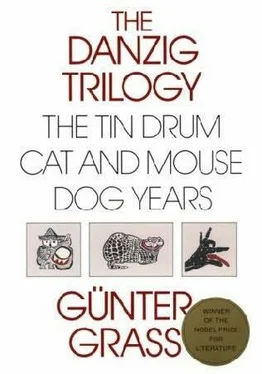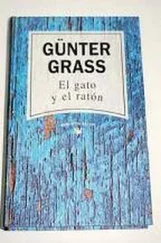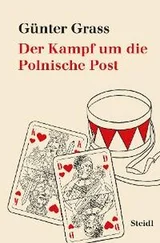
Günter Grass
Cat and Mouse
Book 2 of the Danzig Trilogy
Translated by Ralph Manheim
First published in German under the title Katz und Maus
… and one day, after Mahlke had learned to swim, we were lying in the grass, in the Schlagball field. I ought to have gone to the dentist, but they wouldn't let me because I was hard to replace on the team. My tooth was howling. A cat sauntered diagonally across the field and no one threw anything at it. A few of the boys were chewing or plucking at blades of grass. The cat belonged to the caretaker and was black. Hotten Sonntag rubbed his bat with a woolen stocking. My tooth marked time. The tournament had been going on for two hours. We had lost hands down and were waiting for the return game. It was a young cat, but no kitten. In the stadium, handball goals were being made thick and fast on both sides. My tooth kept saying one word, over and over again. On the cinder track the sprinters were practicing starts or limbering up. The cat meandered about. A trimotored plane crept across the sky, slow and loud, but couldn't drown out my tooth. Through the stalks of grass the caretaker's black cat showed a white bib. Mahlke was asleep. The wind was from the east, and the crematorium between the United Cemeteries and the Engineering School was operating. Mr. Mallenbrandt, the gym teacher, blew his whistle: Change sides. The cat practiced. Mahlke was asleep or seemed to be. I was next to him with my toothache. Still practicing, the cat came closer. Mahlke's Adam's apple attracted attention because it was large, always in motion, and threw a shadow. Between me and Mahlke the caretaker's black cat tensed for a leap. We formed a triangle. My tooth was silent and stopped marking time: for Mahlke's Adam's apple had become the cat's mouse. It was so young a cat, and Mahlke's whatsis was so active – in any case the cat leaped at Mahlke's throat; or one of us caught the cat and held it up to Mahlke's neck; or I, with or without my toothache, seized the cat and showed it Mahlke's mouse: and Joachim Mahlke let out a yell, but suffered only slight scratches.
And now it is up to me, who called your mouse to the attention of this cat and all cats, to write. Even if we were both invented, I should have to write. Over and over again the fellow who invented us because it's his business to invent people obliges me to take your Adam's apple in my hand and carry it to the spot that saw it win or lose. And so, to begin with, I make the mouse bob up and down above the screwdriver, I fling a multitude of replete sea gulls into the fitful northeast wind, high over Mahlke's head, call the weather summery and persistently fair, assume that the wreck was a former mine sweeper of the Czaika class, and give the Baltic the color of thick-glass seltzer bottles. Now that the scene of action has been identified as a point southeast of the Neufahrwasser harbor buoy, I make Mahlke's skin, from which water is still running in rivulets, take on a texture somewhere between fine and coarse-grained. It was not fear, however, that roughened Mahlke's skin, but the shivers customary after long immersion in the sea that seized hold of Mahlke and took the smoothness from his skin.
And yet none of us, as we huddled lean and long-armed between our upthrust knees on the remains of the bridge, had asked Mahlke to dive down again into the fo'c'sle of the sunken mine sweeper and the adjoining engine room amidships, and work something loose with his screwdriver, a screw, a little wheel, or something really special: a brass plate inscribed with the directions in Polish and English for operating some machine. We were sitting on the superstructure, or as much of it as remained above the water, of a former Polish mine sweeper of the Czaika class, built in Gdynia and launched in Modlin, which had been sunk the year before southeast of the harbor buoy, well outside the channel so that it did not interfere with shipping.
Since then gull droppings had dried on the rust. In all kinds of weather the gulls flew sleek and smooth, with eyes like glass beads on the sides of their heads, grazing the remains of the pilothouse, then wildly up again, according to some indecipherable plan, squirting their slimy droppings in full flight – and they never fell into the soft sea but always on the rusty superstructure. Hard, dense, calcareous, the droppings clung fast, side by side in innumerable spots, or heaped up in mounds. And always when we sat on the barge, fingernails and toenails tried to chip off the droppings. That's why our nails cracked and not because we bit our fingernails – except for Schilling, who was always chewing at them and had nails like rivets. Only Mahlke had long nails, though they were yellow from all his diving, and he kept them long by neither biting them nor scratching at the gull droppings. And he was the only one who never ate the chips we broke loose – the rest of us, because it was there, chewed the stony, shell-like mess into a foaming slime, which we spat overboard. The stuff tasted like nothing at all or like plaster or like fish meal or like everything imaginable: happiness, girls, God in His heaven. "Do you realize," said Winter, who sang very nicely, "that tenors eat gull droppings every day?" Often the gulls caught our calcareous spittle in full flight, apparently suspecting nothing.
When shortly after the outbreak of the war Joachim Mahlke turned fourteen, he could neither swim nor ride a bicycle; there was nothing striking about his appearance and he lacked the Adam's apple that was later to lure the cat. He had been excused from gymnastics and swimming, because he had presented certificates showing him to be sickly. Even before he learned to ride a bicycle – a ludicrous figure with his deep-red, protuberant ears and his knees thrust sideways as he pedaled – he reported for swimming in the winter season, at the Niederstadt pool, but at first he was admitted only to the "dry swimming" class for eight-to-ten-year-olds. Nor did he make much progress the following summer. The swimming teacher at Brösen Beach, a typical swimming teacher with a torso like a life buoy and thin hairless legs, had to put Mahlke through his paces in the sand and then hold him by a life line. But after we had swum away from him several afternoons in a row and come back telling fantastic stories about the sunken mine sweeper, he was mightily inspired and in less than two weeks he was swimming.
Earnestly and conscientiously he swam back and forth between the pier, the big diving tower, and the bathing beach, and he had no doubt achieved a certain endurance by the time he began to practice diving off the little breakwater outside the pier, first bringing up some common Baltic mussels, then diving for a beer bottle filled with sand, which he threw out pretty far. My guess is that Mahlke soon succeeded in recovering the bottle quite regularly, for when he began to dive with us on the mine sweeper, he was no longer a beginner.
He pleaded with us to let him come along. Six or seven of us were getting ready for our daily swim, elaborately moistening our skins in the shallow water of the family pool, as a precaution against sudden chill. And there was Mahlke on the plank walk: "Please take me with you. I'll make it, I'm positive."
A screwdriver hung around his neck, distracting attention from his Adam's apple.
"OK!" And Mahlke came along. Between the first and second sandbank he passed us, and we didn't bother to catch up with him. "Let him knock himself out."
When Mahlke swam breast stroke, the screwdriver bobbed visibly up and down between his shoulder blades, for it had a wooden handle. When he swam on his back, the wooden handle danced about on his chest, but never entirely covered the horrid piece of cartilage between chin and collarbone, which cut through the water like a dorsal fin, leaving a wake behind it.
Читать дальше













